Are you worried about the condensation on your windows? One simple method of addressing this is using vinegar. You may have heard of this method and wonder if it actually works. Well, we have done the research to answer that question in this post!
Vinegar stops condensation from forming on your windows. What vinegar does is break down the water molecules as they hit the window, so they do not have a chance to go back to liquid form.
Mix one part vinegar with one part water. You can use this solution to stop condensation on your windows by spraying or rubbing it on the glass. This also works during colder weather when your windows are more prone to condensation.
While vinegar works on condensation, there are a few questions that come to mind. For example, how exactly does vinegar work on condensation? And what about the smell? There are also other alternatives to stopping condensation on windows. If you want to learn more about these, then read on!
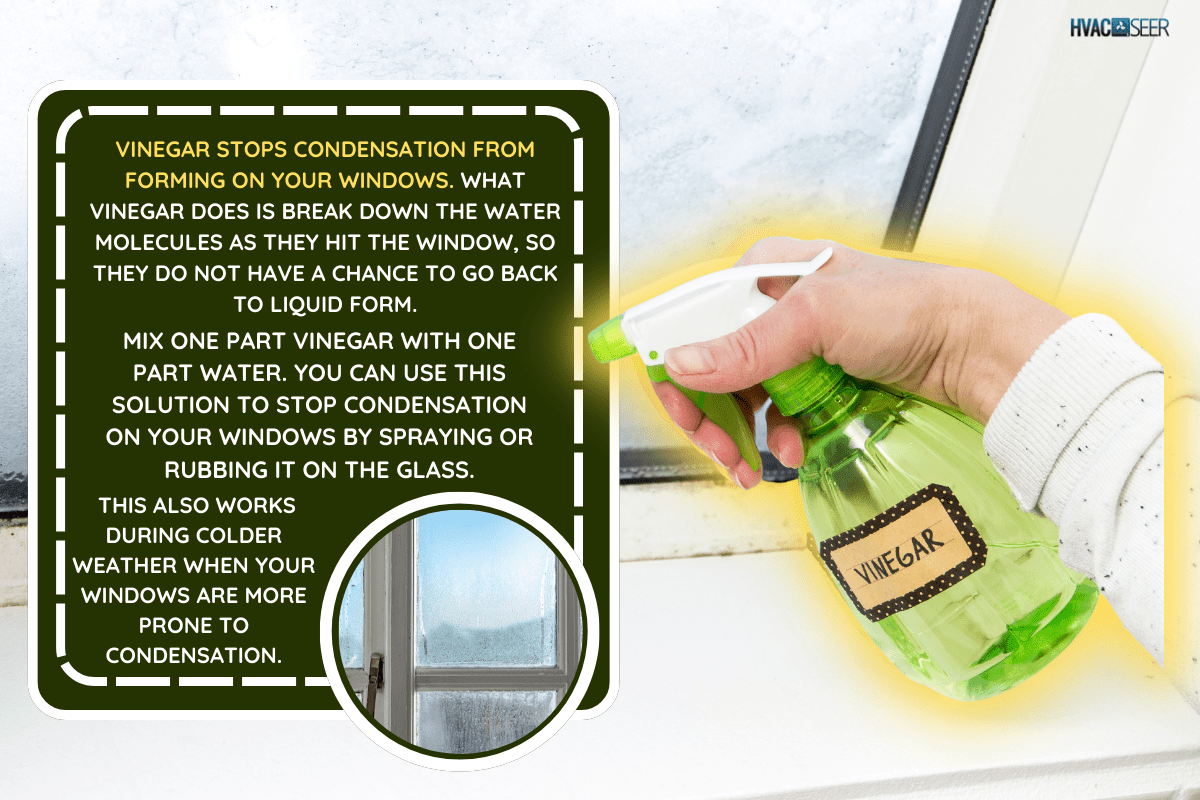
How Does Vinegar Stop Condensation On Windows?
Vinegar is a good substitute for condensation spray. It has anti-fogging properties that take effect when used on windows.
To understand how vinegar works to combat condensation, we need to understand how condensation on windows happens in the first place.
Condensation happens when the air outside the window is colder than the air inside your house or car (or vice versa). When warm air comes into contact with the window, it cools down.
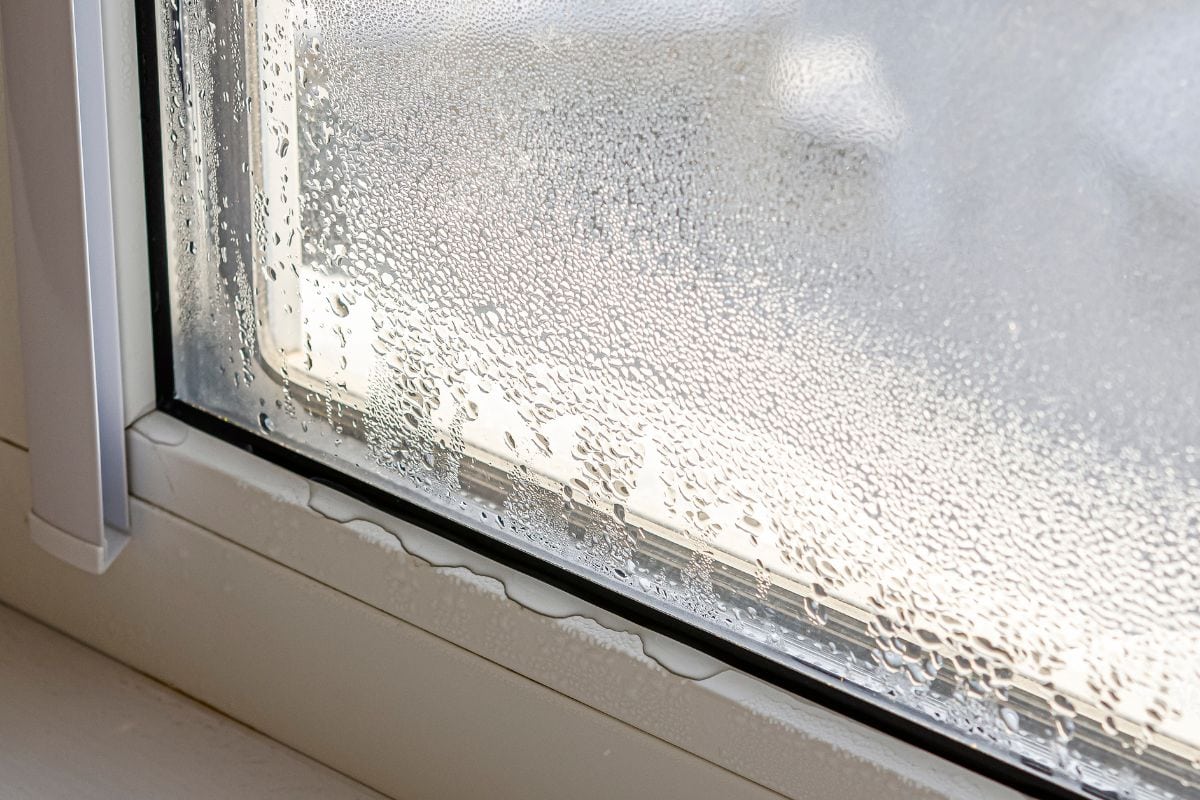
This leads to condensation, or the process where water vapor turns back to liquid at low enough temperatures. When you put a layer of vinegar on your window, it interrupts the flow of the air coming into contact with the window.
Vinegar minimizes surface tension on the window so water droplets do not form. Instead, it has an altered degree of moisture and forms a film over the layer of vinegar.
Does Using On Vinegar On Windows Smell?
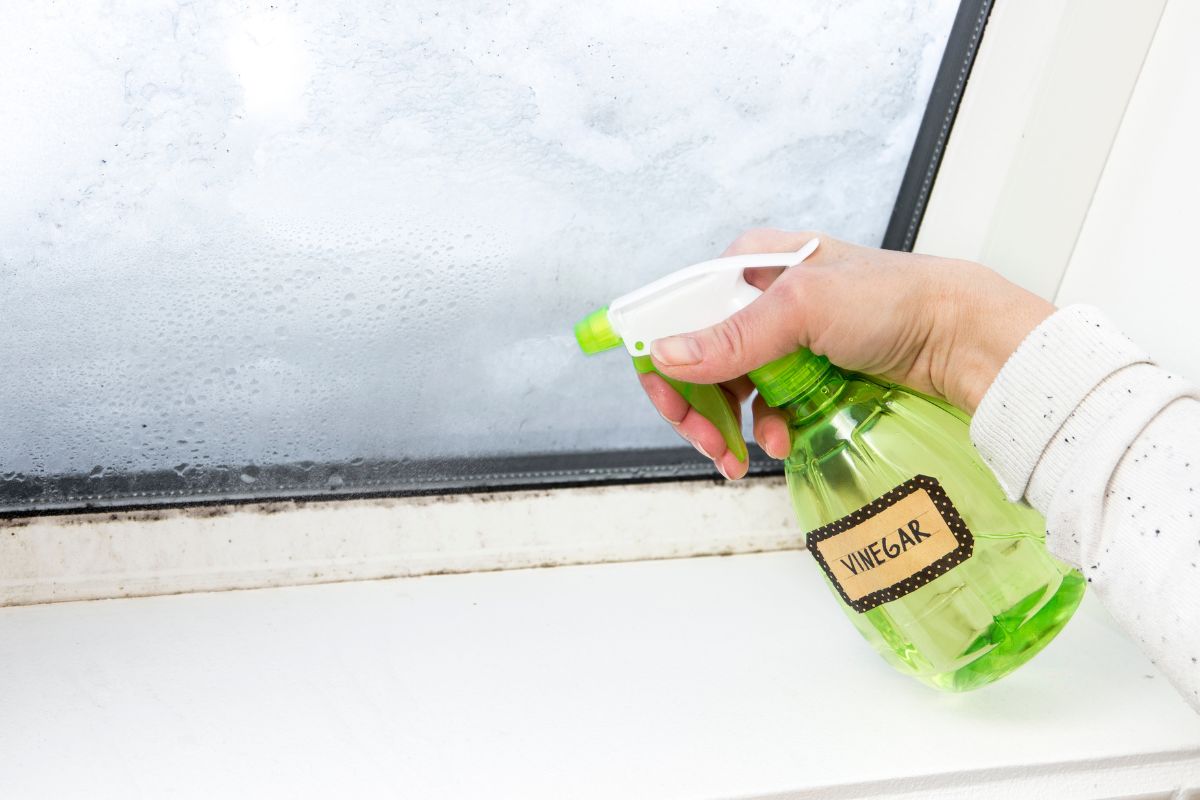
Though vinegar has a strong smell, you do not have to worry about it lasting too long. This is especially so for well-ventilated rooms.
The vinegar smell should go away after around 30 minutes, or the amount of time it takes to dry. But you can combat the smell in other ways.
If you have an air conditioner or air filter, these can easily neutralize the smell of vinegar. If you do not, then leaving out some baking soda will have the same effect. You can also mask the smell of vinegar with air purifiers or incense.
Using vinegar is a common trick to avoid condensation on windows since it is cheap and easy. There are other alternatives which we will talk about later in this article.
Is Condensation On Windows Bad?
Condensation on your windows is natural. Nevertheless, ignoring it is dangerous.
Having moist, damp windows can lead to major health risks because it promotes the growth of mold and fungus. High moisture concentration also promotes high air pollutant concentration.
Moisture due to condensation can rot the structure of your home. It can also be the cause for foul odors. While you might not find condensation to be bothersome, it is bound to cause you issues when left for too long.
When you use anti-condensing agents, de-foggers, and the like on your windows, you are doing more than just preventing the appearance of water droplets. Most of these solutions, including vinegar, have antibacterial and antifungal properties.
This means that when you use a product to stop condensation on your windows, you are also adding an extra layer of protection against harmful substances. If you do not use an anti-condensation product, dry windows are still safer compared to moist ones.
How Do You Stop Condensation On Windows In Winter?
Condensation on windows is a result of high humidity levels. Humidity refers to the amount of moisture in the air. So if you have a humidifier at home, consider turning it down a few notches to see if this helps solve the issue.
Circulation also plays a role in the humidity of a room. You can promote circulation by opening up the doors and windows and turning on exhaust fans, or through your home ventilation system.
Condensation can happen anywhere in your home, not just on windows, so long as it is a cool surface. Mirrors, table tops, and doors can also have condensation. The vinegar trick will not work for all these things but are a great option for glass surfaces.
Should You Wipe Condensation Off Windows?
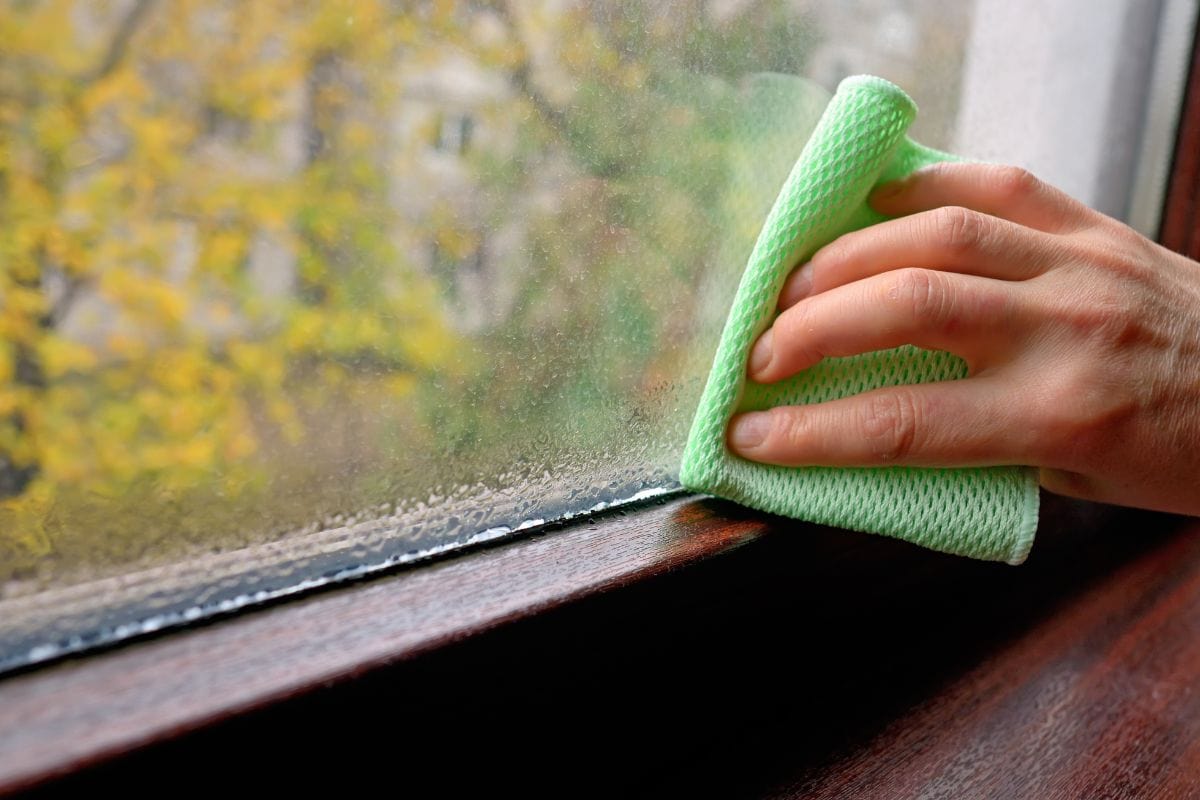
You should wipe down condensation on your windows. The best tool for this is an absorbent microfiber cloth, since it will take away all the moisture and leave your windows dry.
You can do this every morning, followed by applying vinegar or the anti-condensation solution of your choice. If the condensation on your windows is not a persistent problem, then you might be able to get away with just wiping it down every morning.
The temperature change between night and day is the most drastic, so it is not unusual to only get condensation first thing in the morning.
Remember to use a highly absorbent, clean cloth when wiping down your windows. If your cloth is not absorbent enough, then you will simply end up pushing the water around while the moisture stays behind.
Click here to see these microfiber cloths on Amazon.
How To Stop Condensation On Double-Paned Windows
Condensation on double-paned windows can be a frustrating problem. Moisture can get in between the panes and linger if the desiccant fails to keep it dry. This type of condensation is more difficult to get rid of.
Condensation between window panes is a sign of poorly installed windows or damage to your windows. Most modern double-paned windows come with two seals that keep water out, and a desiccant or water-absorbing chemical inside. Normally, this should be enough to avoid moisture.
Condensation between panes can also happen to your windows with age. Double-paned windows will start to break down at the 10-year mark, so you can expect to start encountering this issue around that time.
There are two common ways to stop condensation between window panes. You could also opt to completely replace the window glass. If you decide to replace it, you only have to worry about the glass and not the frame, unless the frame also has damage.
The first way to stop condensation is by heating the glass with a hair dryer. Be careful when you do this, because you don't want to break the glass. This will dry up the inside temporarily, but the condensation will be back after it cools down again.
A more long-term solution is to drill a small hole through the window for trapped air to escape. You can also use this as an opportunity to place a new desiccant inside or clean between the panes. If all else fails, you will have to replace the glass panes.
Other Remedies For Condensation On Windows
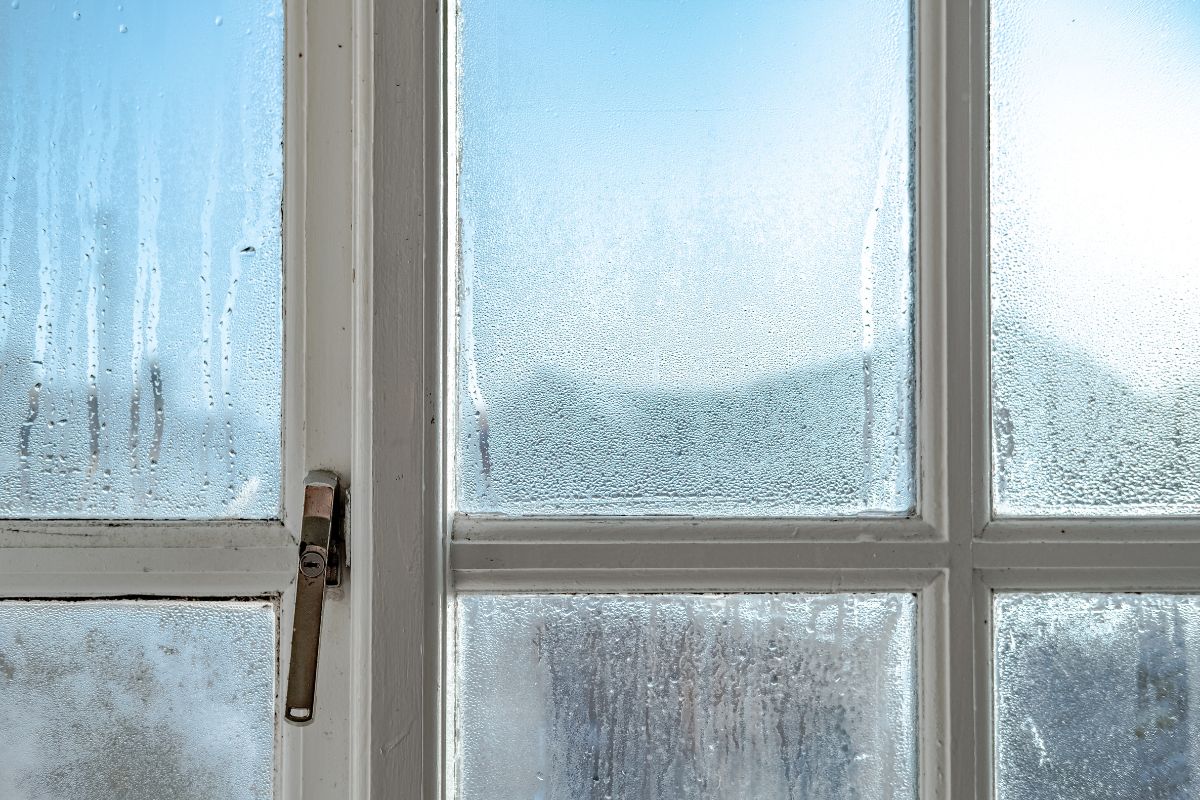
Aside from using vinegar, there are other methods you can use to stop condensation on your windows. These methods involve using kitchen items: you can try leaving out rock salt or baking soda.
Both rock salt and baking soda will absorb the moisture in the air and can help minimize humidity in the room. These methods may work to an extent. However, condensation could still form if the moisture level in the air is too high.
Homes that experience over 50% humidity could benefit from a dehumidifier. The device will target condensation by minimizing how much moisture is in the air and leave your home less susceptible to mold growth and strange odors.
Click here to see this dehumidifier on Amazon.
Do not mix up a humidifier and dehumidifier. We mentioned the former previously in this article. A humidifier helps add more moisture to the air for homes with under 30% humidity.
If you experience condensation while a humidifier is on, it is best to turn it down or turn it off.
Wrapping Things Up
Vinegar is a great way to stop condensation on windows. It is a go-to method for those who want to prevent condensation with natural remedies. The smell goes away in less than an hour, and it is effective as well as antibacterial.
You can use other ways to stop condensation on your windows, such as adjusting the humidity or air circulation in your home.
Whatever method you choose, preventing condensation is a must for your home. Doing so prevents health risks and moisture-related damage to your house.
Did you find this post helpful? If you did, check out our other articles before you go!


